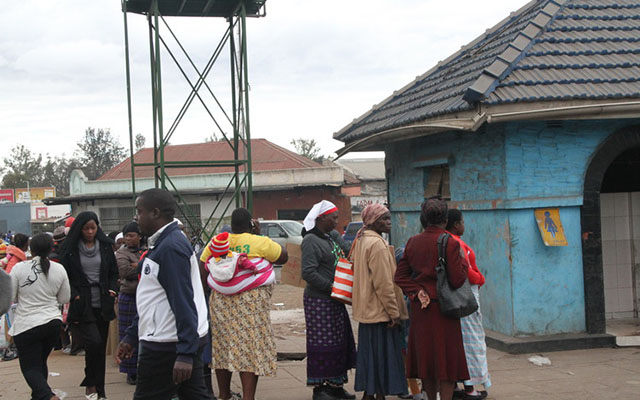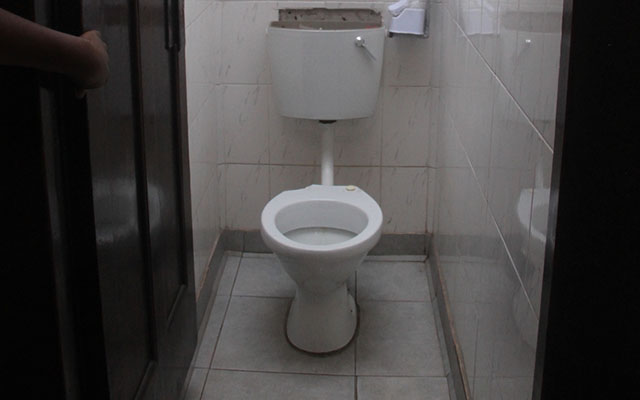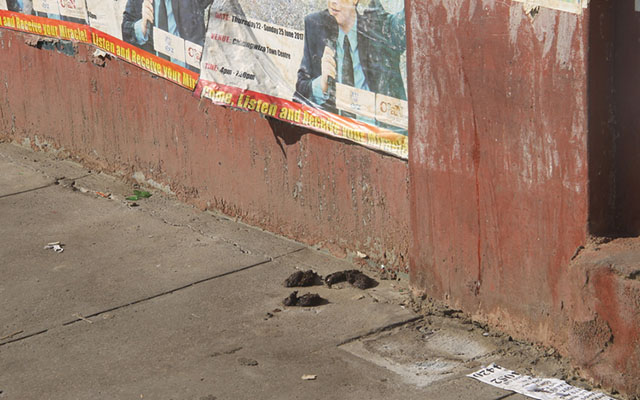Harare’s public toilets a ‘headache’

Runyararo Muzavazi Features Writer
The growing human population in the Harare Central Business District (CBD) seems to be overwhelming the convenience facilities available for public use. As a result, most alleyways and dark corners have been turned into toilets where vendors, people living in streets, commuter omnibus drivers and conductors relieve themselves.
Bottles filled with urine and human waste are a common site at bus ranks and streets, as drivers and their conductors use them when they are too lazy to visit an alley.
Public toilets are in a bad state.
For a city that is eyeing World City Status by 2020 the stench in the streets of Harare and the faecal matter in alleys presents a scenario far from ideal.
A survey by The Herald Review showed that toilets located at Market Square and Fourth Street bus terminals are often vacant as continuous pipe bursts of raw sewer render them unfit for use.
Behind the smelly toilets are vendors selling fresh fruits and snacks presenting a threat to public health with possible diseases outbreaks.
Of all the free toilets in Harare CBD, Rezende Street terminus is fathomable, the rest are hard to use even in moments of desperation.
A kombi driver who operates along Robert Mugabe Road said public toilets were too smelly and dirty making it better to relieve self in the city’s alleys.
“Using alleys is better than the toilet as they are either closed or too smelly. The alley is better as it is cleaned by rain water and the smell is refreshed because it is in the open. Toilets are also a distance away, I just use the alleys nearby,” he said.
There is a severe shortage of public ablution facilities which meet minimum acceptable standards, let alone standards harmonious with a world-class city.
Most toilets around the city open the male section while the female is always closed, as men are comfortable just using urinaries unlike women who use toilet seats.

The clean and well kept pay toilets are proving too costly for informal traders who make us a significant demographic in the CBD
In pay toilets there is provision of tissue paper and loads of water on standby in case they experience water shortages unlike public free toilets where one can use newspapers, cardboard boxes among other alternatives which may result in the blockage of sewer pipes.
Women seem to be mostly affected by this shortage especially those who are suffering with conditions like incontinence who need convenient toilet facilities. Women who will be menstruating also face similar challenges as they have to change their sanitary pads regularly.
Agnes Chimuto who is a vendor at Copacabana Market lamented over the shortage and state of toilet facilities.
“Generally people use alleys and dark corners because they cannot afford to pay for toilet use and long queues at public toilets are unbearable such that one ends up taking refuge in the alleys or use bottles to relieve themselves.
The current poor water supply, breakdown in sewer systems and sanitation has increasingly exposed Harare residents to risky conditions,” she said.
According to Chimuto it is a miracle that there has not been a cholera outbreak.
To informal traders, using the pay toilet is a luxury they cannot afford.
“Every time you use the pay toilet you pay $0,50 it would be better if they reduced the fee to at least $0,20 so that it makes sense. For a person who makes less than $5 a day I cannot channel my profits for toilet use,” said Chimuto.

In the absence of toilets, the highly populated Ximex Mall area has been notorious for open defacation and urine stench. — ( Pictures by Tariro Kamangira)
Experts are concerned with the current situation in the capital.
Renowned town planner and local governance expert, Mr Percy Toriro said there was need for increased toilets.
“When any public spaces are created there are general planning principles that determine what amenities or support services come with certain land use. Some planning principles or guidelines are specific whilst others are general. For example planning standards state that when public places are built there is need for ablution facilities for public convenience because it is nature that people need such facilities,” he said.
Toriro said the upsurge in market traders posed a sanitation problem which needed attention.
“When the toilets were built they were fairly distributed in the CBD in areas with high public concentration such as bus terminals, public parks and markets like First Street which was the premier pedestrian shopping area.
Unfortunately the number of market traders mainly vendors has increased astoundingly over the past decade which present new sanitation problems in terms of provision of both refuse generated by tens of thousands of vendors as well as meeting their ablution needs,” Mr Toriro said.
Toriro called upon city council to conduct research and assessments on the available toilets.
“This increase calls for a survey of the existing facilities to asses them for adequacy for different use categories. Best practice calls for provision of both paid and free toilets .Whilst there is need for cost recovery in service provision, care must be taken to ensure everyone has somewhere to relieve them,” he said.
Demand for toilets has now exceeded supply, hence the need for more toilets.
“Unfortunately, failure by authorities to adopt continuous evidence based decision making means there is now a disconnection between demand and supply. We encourage authorities to continuously plan and upgrade all public utilities,” he said.
Vendors in the city of Harare recently cried foul over the increased tariffs questioning if the tariffs were being used for their betterment after the council announced that it had earned $800 000 from vendors operating from their stalls yet there is no visible change.
Harare Residents Trust director, Mr Precious Shumba said the city’s public toilets were scant in comparison to the population they are meant to serve.
“Harare’s public toilets are inadequate to service the growing population. This can be seen in high density suburbs where public toilets at the shopping centres have become shelters or storehouses for council workers. This deprives people, including vendors’ access to public facilities built using ratepayers’ funds,” said Mr Shumba.
“The availability of pay toilets is unwelcome to most residents, the concern is around the cost of accessing them. The Central Business District is heavily congested which over stretches the available facilities”.
Shumba says the onus is on the city fathers to ensure that these facilities are efficient to service the multitudes of vendors in the city.
“The original plan was that people would be absorbed in the light and heavy industrial areas which kept the majority of the people out of the CBD. The number of vendors matches the growing number of unemployed citizens, thus it is nearly impossible for a local authority as disorganised as the city of Harare to have a flexible plan,” he said.
He urged Government to make efforts in making job opportunities available in a bid to reduce the numbers of vendors in the CBD.
“The issue is not necessarily the shortage of toilets, the root cause of what we are witnessing today regarding vendors is the capacity by Government to create employment opportunities for its citizens.
Increasing the number of toilets as an intervention is a short-term solution that does not address the key issue of sustainable livelihoods. The options for the residents are minimal or non-existent,” he said.
“Our focus should be on developing coherent and sustainable waste management systems that ensures that all waste being generated is properly and timeously disposed of. As for toilets, Government needs to act fast to create jobs to accommodate these vendors who are equal citizens, deserving equal treatment and equal economic opportunities”.
Harare City Council corporate communications manager Mr Michael Chideme said council was in the process of building toilets across Harare.
“We are in the process of building 11 toilets in Harare, and we call upon the private sector to come and invest in the construction of these toilets which are going to be mostly pay toilets,” Chideme said.
“Toilets are very important for a city because they incentivise tourists to visit Harare. The toilets that we are constructing will have baby changing facilities and are going to be women friendly with sanitary wear provision,” Chideme said.
He added: “We have a total of 113 toilets in Harare with 92 functioning and 21 not functional. The figures are a clear indication of inadequate toilets which are not able to meet the demands of the growing population.”
Ablution facilities are insufficient to service the 10 000 registered vendors and an estimated 10 000 unregistered vendors operating in the CBD not mentioning the kombi drivers and people who frequent the CBD.
Questions continue to rise over the issue of public toilets compared to pay toilets. If council is planning on increasing pay toilets isn’t it going to worsen the cases of people using alleys as toilets and even dark corners because people do not have disposable incomes which do not allow them to use pay toilets .
Responding to the issue of pay toilets being unaffordable by the public Mr Chideme said: “It’s not about affordability, we need money to maintain these toilets. As such we need a model that works, council have already engaged food courts, shopping malls, hotels and sit-in restaurants and departmental stores to offer toilet facilities to their customers.
“We have also warned business operators to gate their alleys so that people in the streets do not take refuge in them so as to reduce incidences of disease outbreaks like cholera and typhoid” he said.
However, council is in the process of engaging Zimbabwe Republic Police to enforce by laws and educate vendors on existing council policies so as to create a stable business environment, order and sanity in the CBD (de-congestion of the CBD) according to the council minutes.
He advised the general public to use toilets responsibly bearing in mind that they were a public good. Food outlets have been a refuge for some informal traders but they too seem to be shutting their doors to non-patrons who try to use their facilities.
With no solution in sight, Harare CBD is on the verge of turning into a cesspit of undesirable sights and smells unexpected of a city usually referred to as the Sunshine City.










Comments